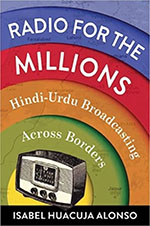Members of the Ajnabi Radio Shrota Sangha (Strangers’ Radio Club) in Bhagalpur, Bihar, regularly tuned into Radio Ceylon, broadcast from Colombo, Sri Lanka, to vote for their favourite songs on Binaca Geetmala, a subcontinental hit countdown show. The club was among 400 radio listeners’ groups that were voluntarily formed by Hindi film music fans in India, mid-1950s onwards, to collectively listen to and talk about the popular music that they ironically did not have access to via their national broadcaster, the All India Radio (AIR). Used to listening to shortwave radio broadcasts during the Second World War, the club members must have locked into Radio Ceylon’s frequency while searching the vast radio spectrum, unmindful of national boundaries, for words and sounds they could relate to.
This is just one of the instances from the history of radio broadcasting in South Asia explored by historian Isabel Huacuja Alonso in her book, Radio for the Millions: Hindi-Urdu Broadcasting Across Borders, where she skillfully and imaginatively highlights the place of the medium in the broader historiographies of nation-building, language, and the public sphere. Spanning three significant ‘radio moments’—the freedom movement and the Second World War, the early post-Independence decades, and the 1965 India-Pakistan war—the book is a constellational account of broadcasting policies and infrastructures, sounds and texts, and audiences in the best traditions of the disciplines of history as well as media studies.

